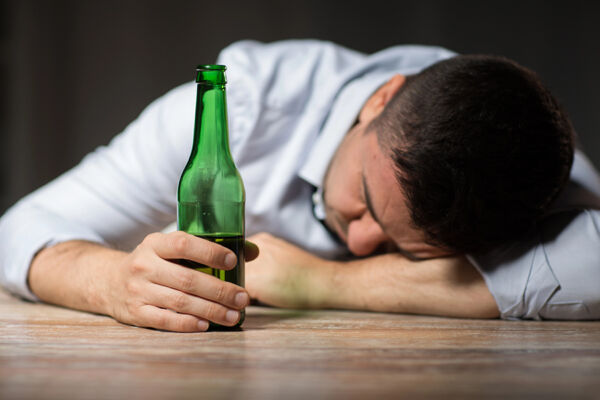In 2023, about 28.9 million Americans aged 12 and older had an alcohol use disorder. If you’re struggling to stop drinking, you’re not alone. This data shows just how prevalent alcohol addiction is in our society. Explore the effects of alcohol abuse to understand the answer to the question of “how hard is it to stop drinking alcohol” and why so many people struggle with addiction.

BEGIN YOUR RECOVERY TODAY!
We can help you achieve permanent sobriety that gives you your life back. Call to learn more about our therapy options in Phoenix, AZ.
Understanding Alcohol Addiction
An alcohol addiction involves a pattern of problematic drinking habits. Considered a chronic disease, alcohol use disorder causes an inability to control your drinking, leading to unpleasant withdrawal symptoms when trying to quit. Overcoming alcohol addiction can be incredibly challenging due to these withdrawal symptoms and other factors.
Prolonged excessive alcohol consumption can result in physical dependence, making it even more difficult to stop drinking. A physical dependence develops through changes in the body and brain. Since alcohol activates the brain’s reward system to produce pleasurable feelings, it encourages repeat consumption. Understanding the difficulties in quitting alcohol can provide insight into why stopping is so difficult.
As you continue drinking, your body develops increased tolerance levels, requiring more alcohol to achieve the same pleasurable effects. This physical dependence, combined with the euphoria drinking produces, makes quitting alcohol challenging.
However, prolonged alcohol abuse also causes various health complications. Short-term effects include alcohol poisoning, dehydration and falls or accidents resulting in injury. Long-term effects include heart disease, liver disease, cancer and diabetes.
Why Is It Hard to Stop Drinking Alcohol?
Several factors, including alcohol withdrawal symptoms, environmental influences and mental health issues, make it hard to stop drinking alcohol. To help with alcohol dependence, understanding these factors is crucial.
Physical Withdrawal Symptoms
Quitting drinking can cause physical withdrawal symptoms, including:
- Shaking
- Sweating
- Nausea and vomiting
- Persistent headaches
- Increased heart rate or blood pressure
- Loss of appetite
- Fever
- Insomnia
- Stomach cramps
- Seizures
Psychological Withdrawal Symptoms
Alcohol withdrawal also causes psychological symptoms, including:
- Anxiety or depression
- Irritability and agitation
- Confusion
- Paranoia
- Mood swings
- Hallucinations
- Nightmares
Some individuals experience delirium tremens, a severe form of withdrawal that includes fever, confusion and rapid heart rate. This symptom can be life-threatening, requiring immediate medical treatment.
Social Factors
Social influence and peer pressure also contribute to problematic drinking. If your friends or family drink heavily or you’re frequently exposed to alcohol at gatherings, you may feel compelled to drink to avoid losing social connections or feeling left out.
Environmental Triggers
Being in a harmful or toxic environment, such as an abusive household, can trigger alcohol cravings, increasing the risk of relapse. You may drink to alleviate feelings of stress or anxiety, disrupting your ability to sustain recovery. This is one of the challenges of alcohol detox that many people face.

Mental Health Issues
Certain mental health issues, including anxiety, depression, bipolar disorder and post-traumatic stress disorder, are linked to alcohol addiction. Some individuals drink to self-medicate their symptoms with the pleasurable effects of alcohol, increasing their risk of becoming physically dependent.
The Role of Brain Chemistry
Alcohol consumption triggers the release of dopamine, a neurotransmitter in the brain responsible for pleasure and reward. As you drink more, the brain associates alcohol with positive feelings. This creates a cycle of dependency, encouraging increased alcohol use to achieve these effects.
Personal and Psychological Challenges
Individuals who abuse alcohol often have underlying personal or psychological issues they’re struggling to cope with. Help with alcohol dependence can be crucial in addressing these underlying issues. Explore common challenges to see if they align with your situation.
Coping Mechanisms
People may use alcohol to cope with stress, mental health symptoms or other difficult emotions they don’t know how to handle. Alcohol slows down the central nervous system, reducing inhibitions and creating feelings of relaxation to replace these unpleasant emotions.
Fear of Change
Alcohol use often becomes intertwined with a person’s identity, routine and social life, making change difficult. Depending on how long you’ve been drinking, the thought of quitting may cause feelings of fear and uncertainty. You may worry that it’ll change the dynamic of your social circle or wonder if you’ll find another coping mechanism to replace it.
Emotional Regulation
When someone quits drinking, they may experience intense emotional fluctuations as their brain adjusts to the absence of alcohol. Previously suppressed emotions, such as fear, grief or anger, may rise to the surface, promoting further emotional instability. Individuals may struggle to regulate their emotions without alcohol, increasing their risk of relapse.
Social and Cultural Influences
External influences can also impact your ability to stop drinking. Understanding these barriers can facilitate important lifestyle changes that encourage sobriety.
Cultural Norms
In many societies, drinking alcohol is deeply embedded in traditions, rituals and everyday life. For example, alcohol is often served at weddings, holidays, festivals and work functions. This constant exposure can make abstaining difficult, interfering with recovery.
Social Pressure
Pressure from friends, colleagues or acquaintances at social gatherings can affect your ability to say no to a drink. Even without direct pressure, certain unspoken expectations, such as participating in a champagne toast, may pressure you to drink to avoid feeling awkward or out of place.
Family Dynamics
A family history of alcohol addiction or abuse can create a cycle of problematic drinking. Children who witness their parents or other family members drinking heavily are more likely to develop similar habits. Those same family members may also enable drinking by downplaying its harmful effects or providing alcohol.

Camelback Recovery’s Approach to Helping You Quit Drinking Alcohol
At Camelback Recovery in Phoenix, AZ, we offer a comprehensive approach to alcohol addiction treatment to help you quit drinking. Our treatment options include medical detox, inpatient rehab, outpatient programs and aftercare to support long-lasting sobriety.
Upon admission to our alcohol treatment center, you receive a personalized care plan addressing your specific needs. This plan outlines the severity of the addiction, suggested services, expected treatment outcomes and personal struggles or goals to facilitate well-rounded care.
Additionally, we provide a serene, supportive environment to prevent distractions and negative influences from interfering with recovery. Our mental health services also aid in recovery, helping you uncover underlying reasons for drinking and learn how to quit alcohol safely with healthier coping skills.
If you or someone you love is struggling with quitting alcohol, don’t wait to seek help. Call Camelback Recovery today at 602-466-9880 to start the recovery process.





